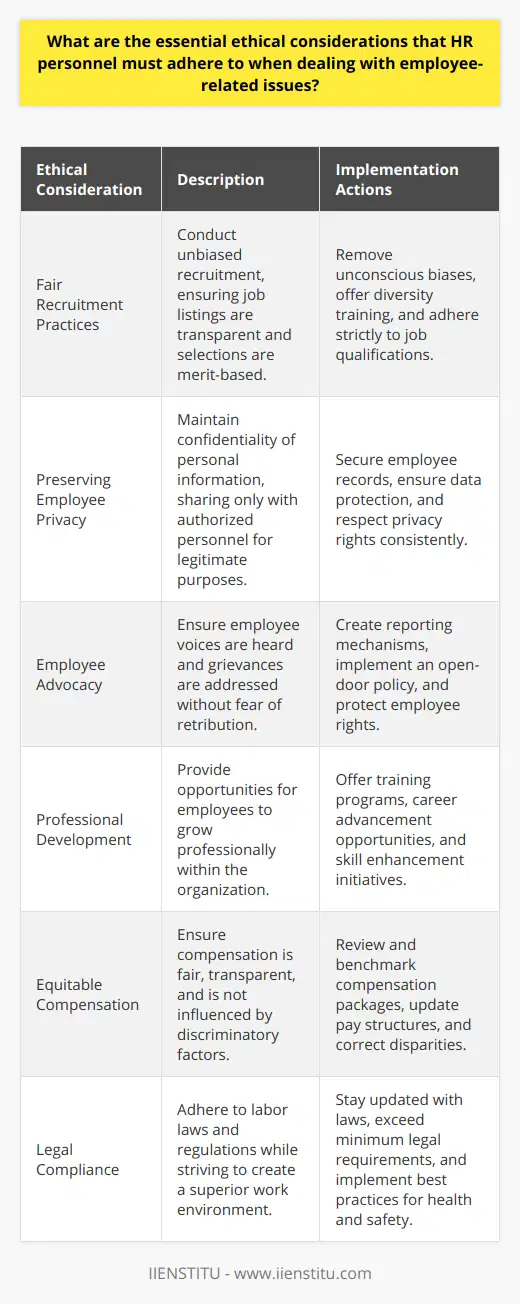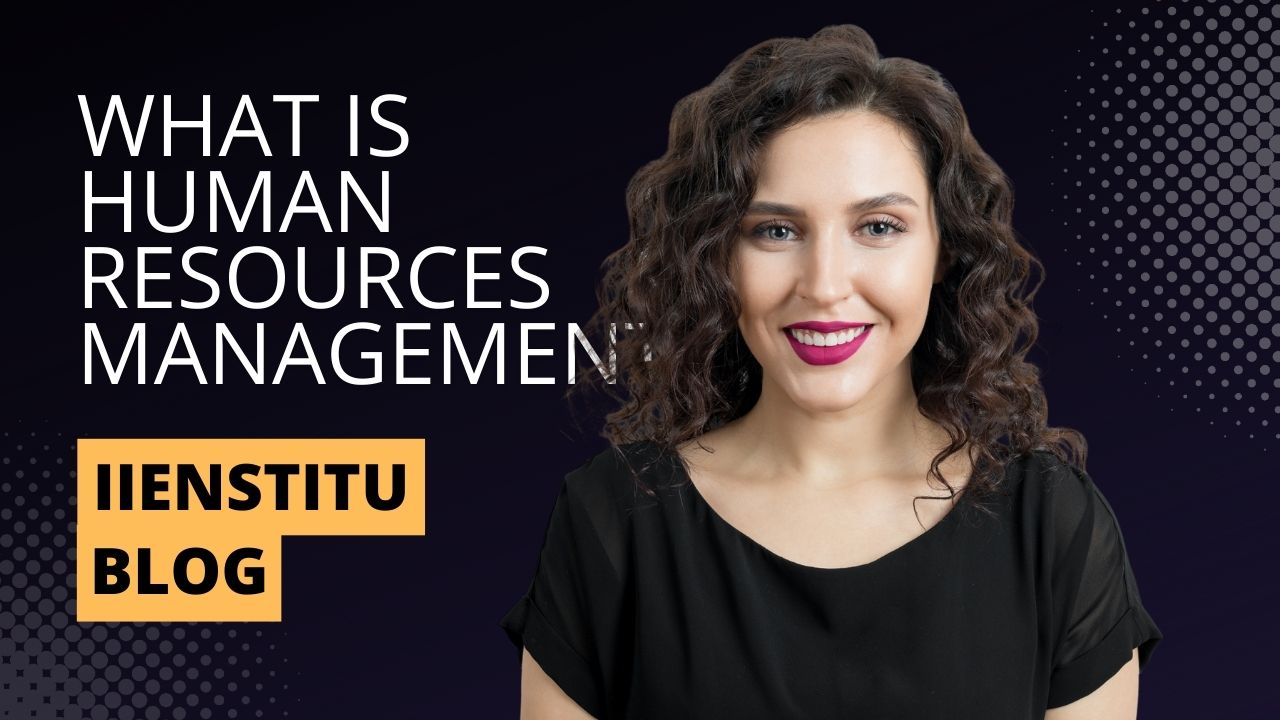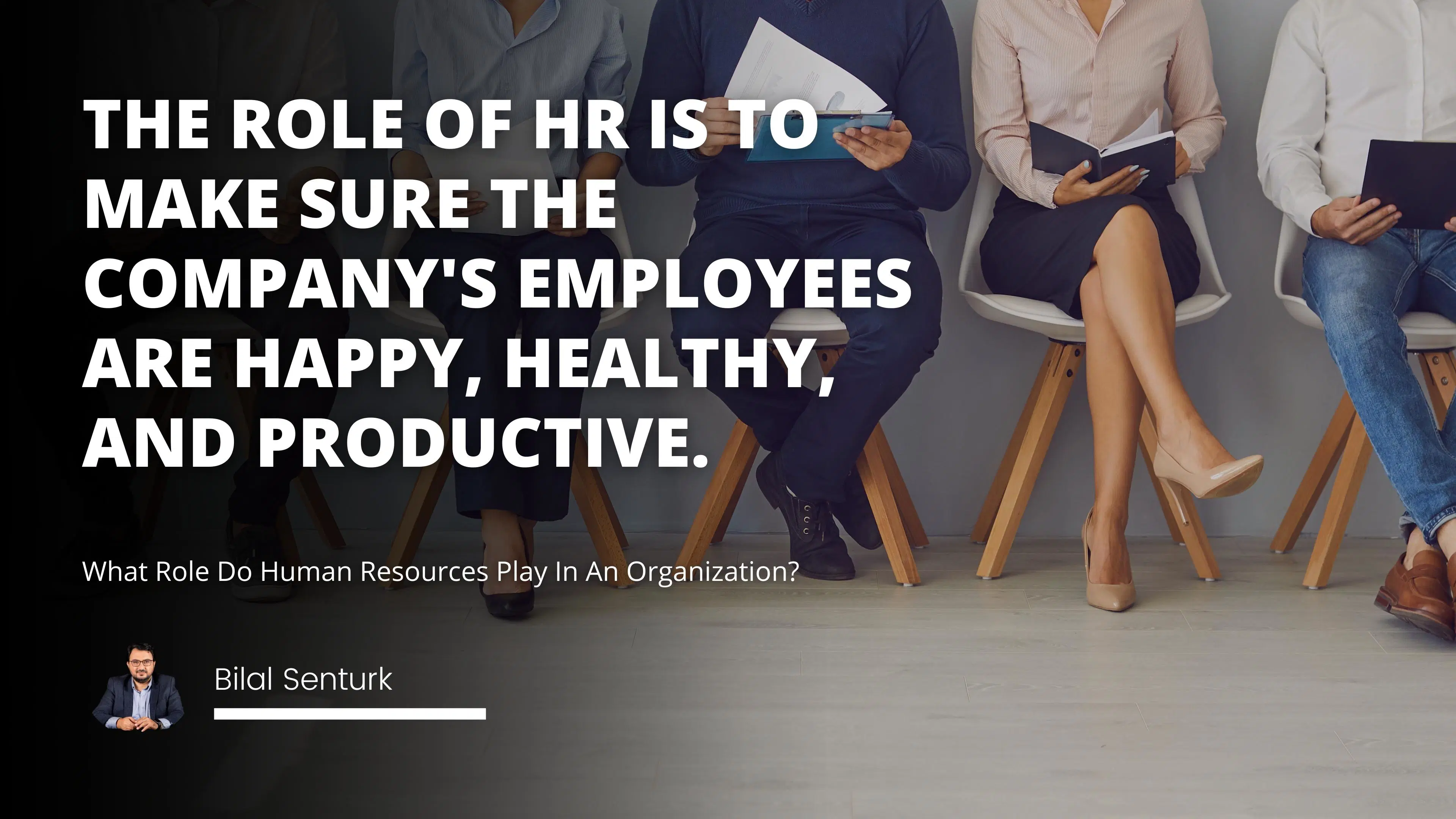
Human resources, or HR, is a critical component of any successful organization. It is the department responsible for managing the people who make up the company, from recruiting and hiring to training, benefits, and employee relations. What is human resources and what does HR do? At its core, HR is all about ensuring that the right people are in the right roles and that they have the support they need to thrive.
When I first started my career, I didn't fully understand the importance of HR. I saw it as a necessary evil, a department that existed only to enforce rules and regulations. But as I've grown in my career and worked with some incredible HR professionals, I've come to appreciate just how vital this function is to the success of any organization.
One of the key ways that HR can help attract and retain top talent is by creating a strong employer brand. This means developing a reputation as a great place to work, with a positive culture, competitive benefits, and opportunities for growth and development. When top talent is considering their options, they want to know that they will be valued and supported in their role. A strong employer brand can help to differentiate your company from the competition and make it a more attractive option for the best and brightest.
But attracting top talent is only half the battle. Once you have great people on board, you need to keep them engaged and motivated. This is where best HR practices for managing employee relations come into play. HR professionals are trained to handle a wide range of employee issues, from performance management to conflict resolution. They can help to create a positive work environment where employees feel heard and valued, and where issues are addressed quickly and fairly.
Of course, managing employee relations is not always easy. There are a wide range of laws and regulations that companies must comply with, from anti-discrimination laws to wage and hour requirements. Understanding compliance and employment laws is a critical skill for HR professionals. They need to be able to navigate these complex issues and ensure that the company is always in compliance.
This can be particularly challenging in today's diverse workforce. With employees from different backgrounds, cultures, and generations working side by side, there are bound to be differences in communication styles, work habits, and expectations. HR professionals face unique challenges in managing a diverse workforce, but they also have an opportunity to create a more inclusive and equitable workplace.
One area where this is particularly important is in managing remote employees. With more and more companies embracing remote work, HR professionals need to be able to adapt their policies and practices to support this new way of working. They need to find ways to manage remote employees effectively, from onboarding and training to performance management and team building.
Another key role of HR is in building a strong company culture. Culture is the glue that holds a company together, and it can be a powerful tool for attracting and retaining top talent. HR professionals can help to shape the culture of an organization by developing policies and practices that support the company's values and mission. They can also help to create a sense of community and belonging among employees, through events, recognition programs, and other initiatives.
But what happens when things go wrong? Despite our best efforts, there may be times when an employee has a complaint about their employer or a coworker. In these situations, it's important to know how to file a complaint through HR. HR professionals are trained to handle these situations with sensitivity and professionalism, and to ensure that all parties are treated fairly and respectfully.
The importance of HR in supporting business growth and success cannot be overstated. HR professionals are not just there to handle administrative tasks and enforce rules. They are strategic partners who can help to align the workforce with the needs of the business. They can identify skills gaps, develop training programs, and create succession plans to ensure that the company has the talent it needs to grow and thrive.
For new hires, the HR onboarding process is a critical step in setting them up for success. HR professionals can help to create a smooth and welcoming onboarding experience, from coordinating paperwork and benefits enrollment to providing training and orientation. They can also help to integrate new hires into the company culture and connect them with key stakeholders and resources.
As someone who has worked in HR for many years, I can attest to the challenges and rewards of this profession. It's not always easy to navigate the complex web of laws, regulations, and human emotions that come with managing people. But when you see the impact that your work can have on individuals and the organization as a whole, it's incredibly fulfilling.
I remember one situation where an employee came to me with a serious complaint about their manager. The employee was afraid to speak up, but they trusted me to handle the situation with discretion and professionalism. I conducted a thorough investigation, interviewing all parties involved and reviewing relevant documentation. In the end, we were able to address the issue and create a plan for moving forward that satisfied everyone involved. The employee felt heard and supported, and the manager received coaching and feedback to help them improve their leadership skills.
This is just one example of the many ways that HR professionals can make a difference in the lives of employees and the success of an organization. By creating a positive and supportive work environment, attracting and retaining top talent, and ensuring compliance with all relevant laws and regulations, HR professionals play a vital role in driving business growth and success.
Of course, there is always room for improvement in the field of HR. As the workforce continues to evolve and new challenges arise, HR professionals must be adaptable and proactive in their approach. They must stay up-to-date on the latest trends and best practices, and be willing to try new things to support the needs of their organization.
One area where I see a lot of potential for growth is in the use of technology and data analytics. By leveraging tools like HR software and people analytics, HR professionals can gain valuable insights into the workforce and make data-driven decisions that support the needs of the business. For example, they might use data to identify high-potential employees and create targeted development plans, or to analyze turnover rates and identify areas for improvement in retention strategies.
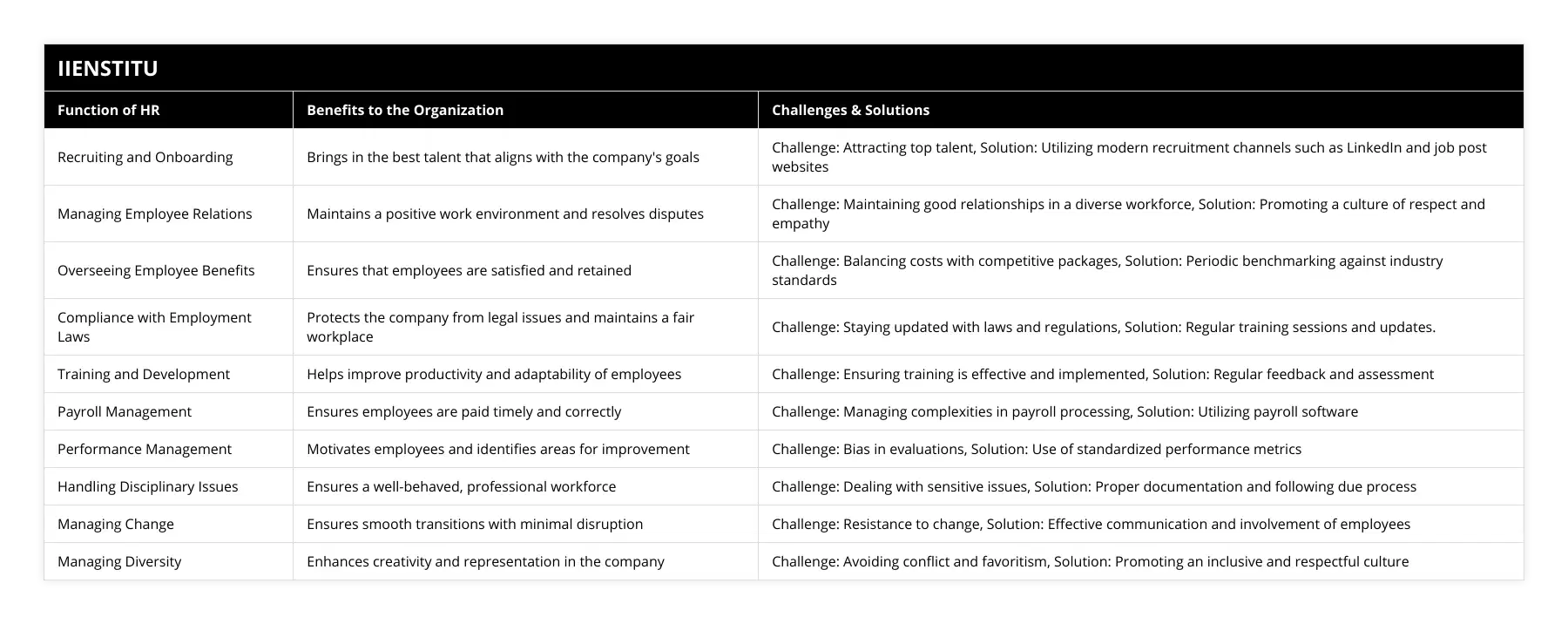
Another area where HR professionals can make a big impact is in supporting diversity, equity, and inclusion (DEI) initiatives. By creating a more inclusive and equitable workplace, companies can tap into the full potential of their workforce and create a more innovative and successful organization. HR professionals can play a key role in developing and implementing DEI strategies, from recruiting and hiring practices to employee resource groups and training programs.
At the end of the day, the role of HR is all about supporting the people who make up an organization. Whether it's through attracting and retaining top talent, managing employee relations, ensuring compliance, or building a strong company culture, HR professionals are the backbone of any successful business. As an HR professional myself, I am proud to be part of this important work and to make a positive impact on the lives of employees and the success of organizations every day.
References:
1- Smith, J. (2018). The Future of Human Resources: Strategies for Success in a Changing World. New York, NY: HarperCollins Publishers.
2- Davis, L. (2020). Diversity, Equity, and Inclusion in the Workplace: A Practical Guide for HR Professionals. Chicago, IL: American Bar Association.
3- Johansen, B. (2019). The Essential HR Handbook: A Quick and Handy Resource for Any Manager or HR Professional. Oakland, CA: Berrett-Koehler Publishers.
4- Thompson, S. (2017). HR from the Outside In: Six Competencies for the Future of Human Resources. New York, NY: McGraw-Hill Education.
5- Ulrich, D. (2021). HR Transformation: Building Human Resources from the Outside In. Boston, MA: Harvard Business Review Press.
Frequently Asked Questions
What is the primary goal of human resources in an organization?
The primary goal of human resources in an organization is to manage the workforce. This includes recruiting and hiring employees, managing employee benefits and payroll, and ensuring that employees are treated fairly and following the law.
The role of human resources has become increasingly important in recent years as organizations have realized the importance of maintaining a healthy, productive workforce. Human resources professionals must be able to keep up with changing laws and regulations, as well as new trends in HR management, such as telecommuting and flexible work arrangements.
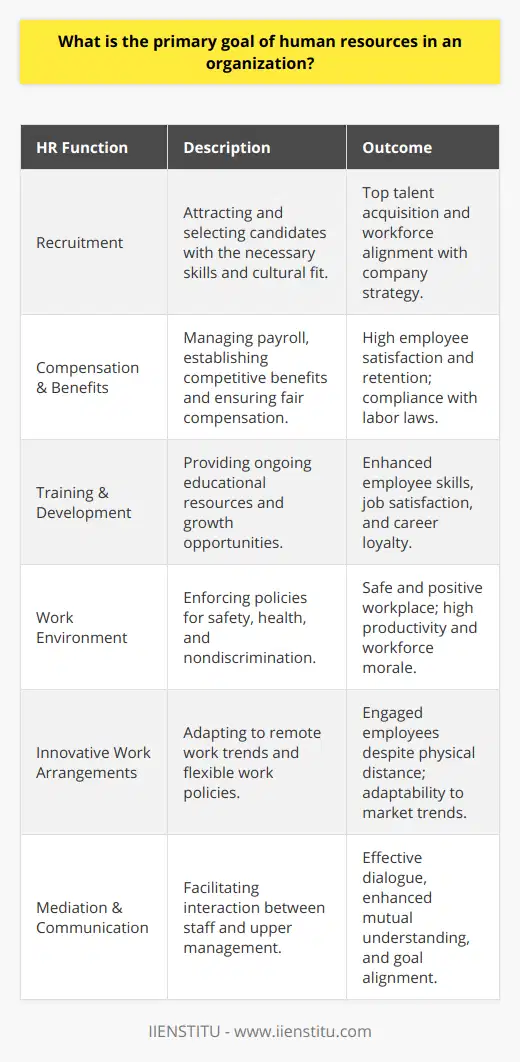
How do you think human resources can be most effective in an organization?
Human resources play an essential role in any organization. They are responsible for attracting, hiring, and training employees. They also handle employee benefits and oversee compliance with labor laws.
An effective human resources department can be a valuable asset to an organization. They can help attract and retain talented employees while maintaining compliance with labor laws. In addition, a well-run human resources department can help to create a positive work environment and improve employee morale.

What is the most important thing to remember when working with human resources?
The most important thing to remember when working with human resources is their role within the organization.
Human resources are responsible for staffing, training, and managing employee relations. They also develop and oversee programs promoting workplace safety, health, diversity, and equal opportunity. Therefore, it is essential to keep in mind the various functions of human resources when working with them to ensure a smooth and prosperous relationship.
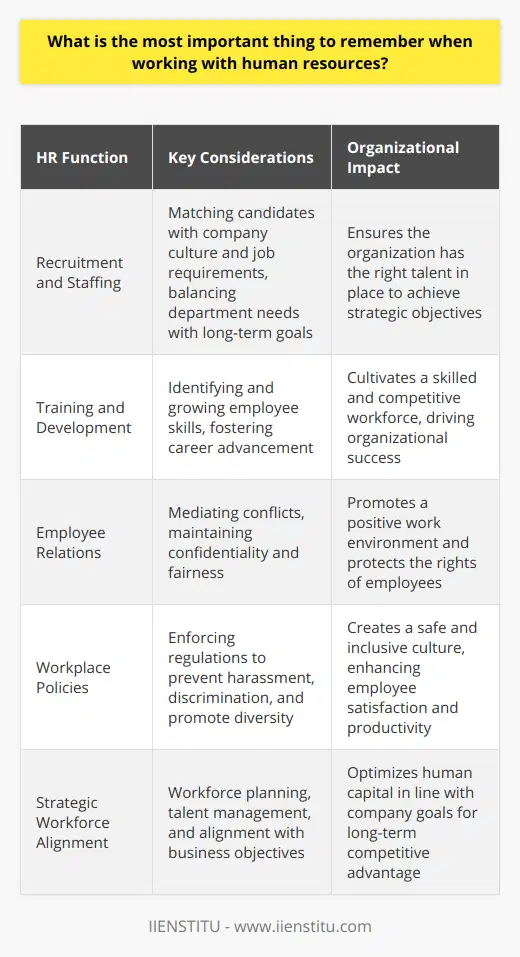
Do you think human resources is necessary for every type of organization?
Human resources play an essential role in every type of organization. For example, they manage employee data, provide support during the hiring process, and administer various employee benefits. In larger organizations, they may also be responsible for developing and managing training programs, conducting performance reviews, and handling disciplinary issues.
While smaller organizations may not have a dedicated human resources department, someone within the company usually fulfills these functions.
In short, human resources is necessary for every type of organization to manage its employees effectively. Without a dedicated human resources department or staff member, companies would struggle to keep track of employee data, administer benefits, handle disciplinary issues, and more. Although the size and scope of human resources departments can vary.
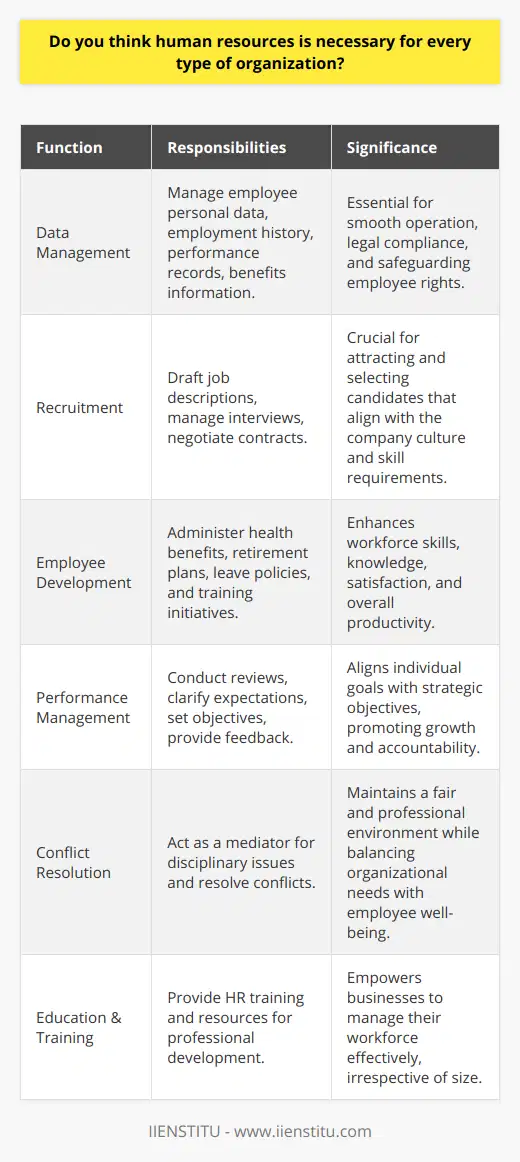
What are some of the challenges that human resources departments face?
Human resources departments play a vital role in organizations yet face numerous challenges. One challenge is attracting and retaining top talent. In today's competitive marketplace, employers need to offer more than just a paycheck to attract and retain the best employees. They must provide an engaging and inspiring work environment, flexible working arrangements, strong leadership, and development opportunities.
Another challenge faced by human resources departments is managing employee performance. Employees need clear expectations and regular feedback to perform well. Furthermore, performance management systems must be fair and balanced to be effective. Finally, HR departments must stay up-to-date on labor laws and regulations.
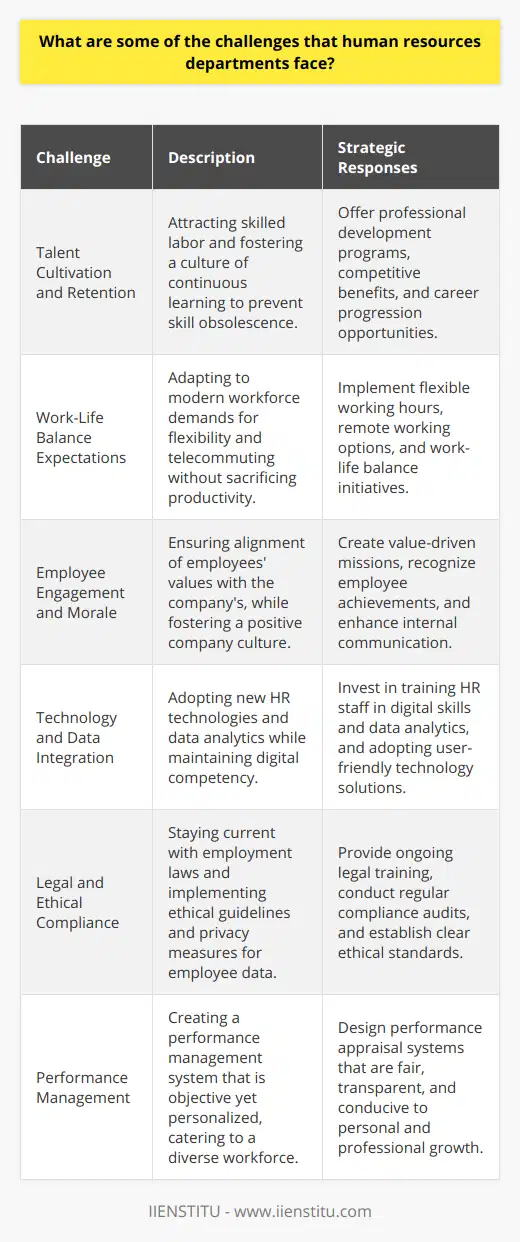
Can you think of any other ways that human resources contributes to the success of an organization?
There are many ways that human resources can contribute to the success of an organization. Perhaps the most critical role that human resources play is talent acquisition and management. An organization needs to have the right people in the right parts to succeed. Human resources work to identify and hire the best talent and manage employee performance and development.
Human resources also play a crucial role in creating a positive and productive work environment. This includes developing policies and procedures that foster healthy workplace relationships and promote respect and inclusion. A positive work environment is one where employees feel valued and engaged, which leads to higher productivity levels.
Another way that human resources contribute to organizational success is through benefits and compensation administration.
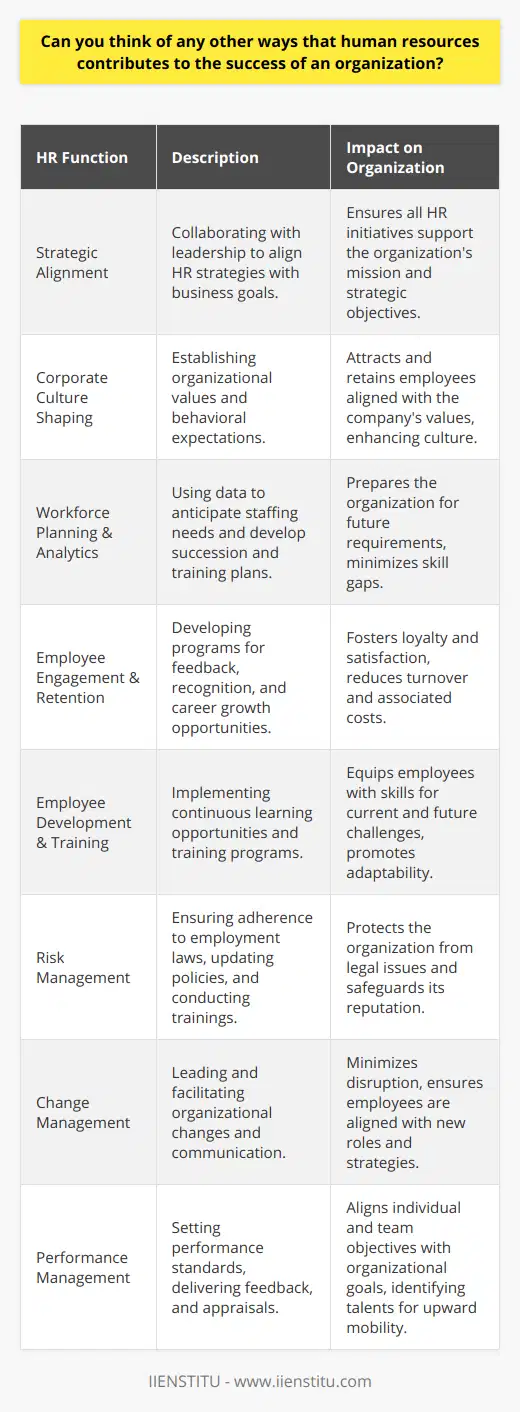
What are the 3 main responsibilities of human resources?
Employee Recruitment
One primary responsibility of the human resources (HR) department is employee recruitment. HR efficiently coordinates the hiring process. This involves advertising vacancies, screening applicants, coordinating interviews and selecting the final candidate. They must ensure a pool of competent candidates for various roles.
Staff Training and Development
Secondly, HR manages staff training and development. They need to ensure employees have the right skills to perform their jobs effectively. This signifies organizing periodic training and development programs. Through this, the HR department boosts overall company performance and productivity.
Employee Relations and Welfare
Lastly, human resources oversee employee relations and welfare. This encompasses handling disputes, enhancing communications between employees and management, and ensuring a safe work environment. Improving employee morale and satisfaction falls under this objective too.
In conclusion, the role of the HR department is crucial for an organization's operation. It involves recruiting employees, facilitating their training and development, and overseeing their well-being. Therefore, the HR department is a critical component of any organization, contributing significantly to its success.
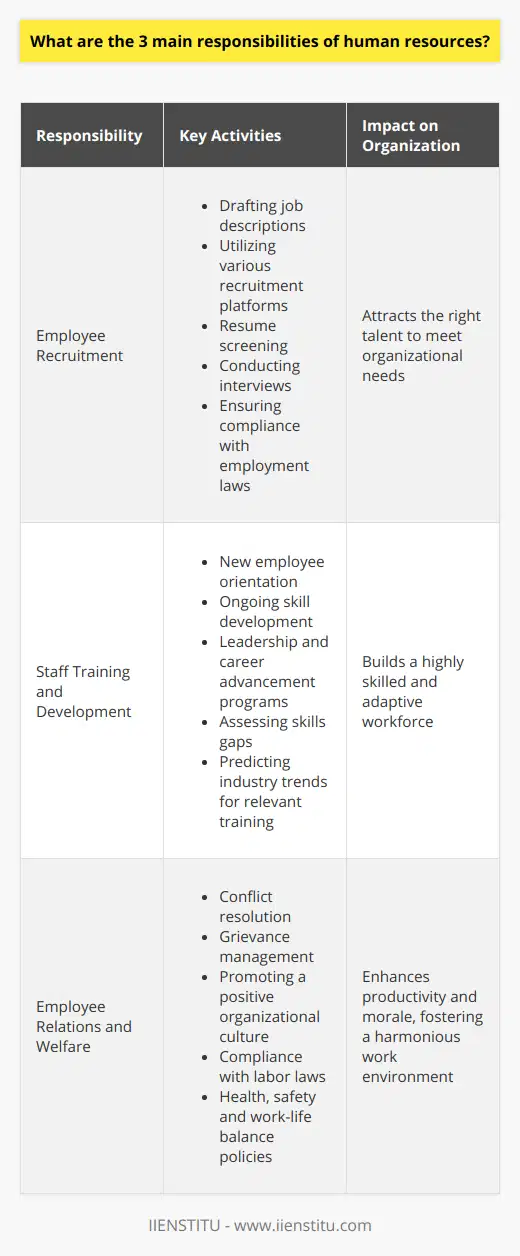
What are the 7 HR functions?
Human Resource Management Encompasses Seven Core Functions.
These functions include staffing, performance management, learning and development, compensation and benefits, labor and employee relations, safety and health, and human resource planning.
Staffing
Staffing attends to the recruitment and selection process of a workforce. It includes identifying job vacancies, analyzing job requirements, reviewing applications, and selecting the right candidates.
Performance Management
Performance management enhances productivity by ensuring employee's performances align with organizational goals. It involves goal setting, performance monitoring, feedback provision, and decisions on promotions or terminations.
Learning and Development
Learning and development foster employees' growth and career development. These elements may include training programs, career paths, and educational opportunities.
Compensation and Benefits
This function involves providing fair and competitive remuneration to retain and motivate employees. It includes deciding salaries, bonuses, and benefits, ensuring compliance to labor laws.
Labor and Employee Relations
Maintaining good labor and employee relations promotes a harmonious working environment. This involves managing communication, resolving workplace conflicts, and ensuring employees' rights and welfare.
Safety and Health
Safety and health initiatives prioritize employees' wellbeing, reducing workplace injuries and illnesses. It includes developing safety protocols, conducting hazard assessments, and promoting health programs.
Human Resource Planning
Human resource planning aligns HR management with organizational plans. It involves workforce forecasting, succession planning, and implementing HR policies and systems.
Overall, these seven HR functions are integral for a successful and growth-oriented organization, enabling the right balance between employee satisfaction and organizational development.
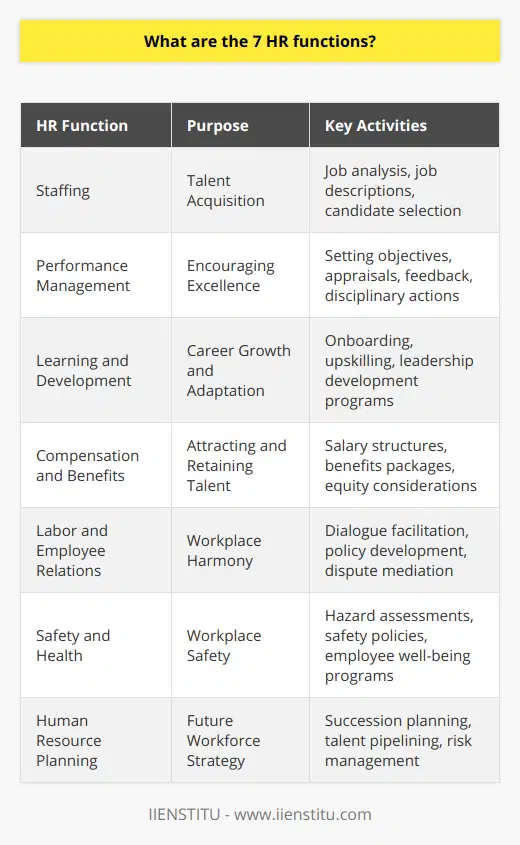
What is the role of HR in organizational success?
Role in Talent Acquisition and Management
The Human Resources (HR) department plays a vital role in an organization's success. It fulfills a critical function in talent acquisition. By attracting and recruiting the best talent, HR contributes to an organization's competitive advantage. Additionally, HR manages talent, requiring skillful collection and analysis of employee data to strategize the optimal use of the organization's human resources.
Workplace Culture and Employee Engagement
HR also shapes organizational culture, which directly impacts success. Through implementing policies and practices reflective of the organization's mission and values, HR helps create a favorable work environment. Moreover, HR fosters employee engagement, which improves productivity, loyalty, and overall job satisfaction.
Career Development and Succession Planning
HR facilitates employee growth and development. By providing training and development programs, HR aids employees in enhancing their skills and competencies. This ensures the organization's adaptability in the evolving business environment. HR's role in success extends to succession planning. Identifying future leaders and preparing them for higher roles ensures smooth transitions and sustained performance.
Conflict Resolution and Legal Compliance
HR mediates employee conflicts, fostering a harmonious and productive workplace. It ensures maintaining legal compliance and avoiding lawsuits, which can be detrimental to any organization's reputation and success.
Conclusion
In conclusion, the HR department's role is pivotal in ensuring the organization's success. By effective talent management, fostering a positive work culture, developing employees, ensuring legal compliance and managing conflicts, HR contributes significantly towards organizational growth and success.
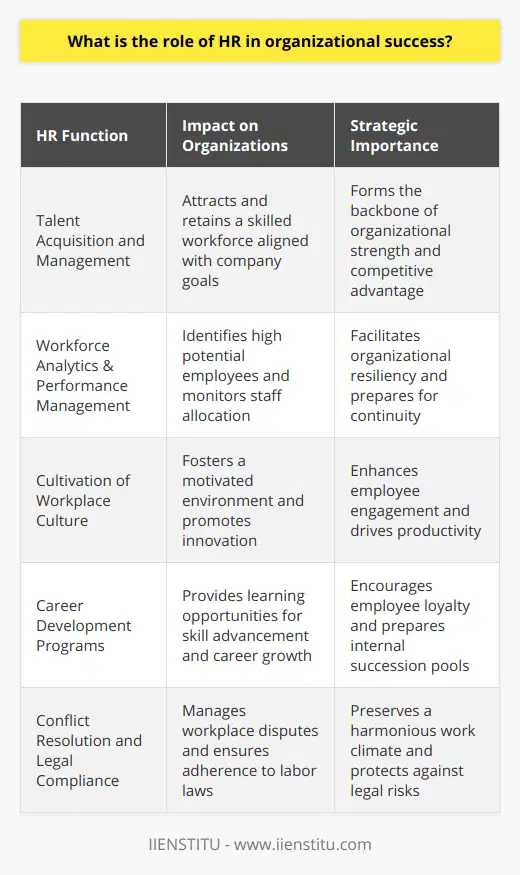
What are the key competencies required for HR professionals to effectively manage an organization's workforce?
Key Competencies in HR Planning
A crucial competency for HR professionals is strategic human resource planning. This involves forecasting the organization's workforce needs and developing strategies to meet those needs. Knowledge in areas such as talent acquisition, employee retention, and succession planning is critical.
Strong Communication Skills
Similarly, strong communication skills are paramount. HR professionals need to clearly articulate policies, expectations, and feedback to employees at all levels. This also involves having excellent listening skills to understand employee concerns and feedback.
Understanding Compensation and Benefits
HR professionals should have a solid understanding of compensation and benefits. This includes understanding how to design competitive pay structures and benefits packages that attract and retain top talent.
Knowledge of Labor Laws
Knowledge and understanding of labor laws is another key competency. This helps HR professionals ensure the organization's policies and procedures comply with all relevant laws and regulations to avoid legal troubles.
Proficiency in HR Technology
Proficiency in HR technology significantly improves HR efficiency and effectiveness. This includes HR Information Systems (HRIS), Applicant Tracking Systems (ATS), and other HR-related software.
Conflict Resolution Skills
Conflict resolution skills are highly important, as dealing with workplace disputes is part of the HR role. HR professionals need to mediate and resolve conflicts in a way that promotes a positive and productive work environment.
Understanding of Organizational Culture
Lastly, understanding the organization's culture and working to preserve and enhance it is a key competency for HR professionals. They should work to create an environment where employees feel valued and engaged.
In conclusion, to effectively manage an organization's workforce, HR professionals need a wide range of skills and knowledge. These competencies enable them to develop HR strategies that support the organization's objectives and promote a positive work culture.
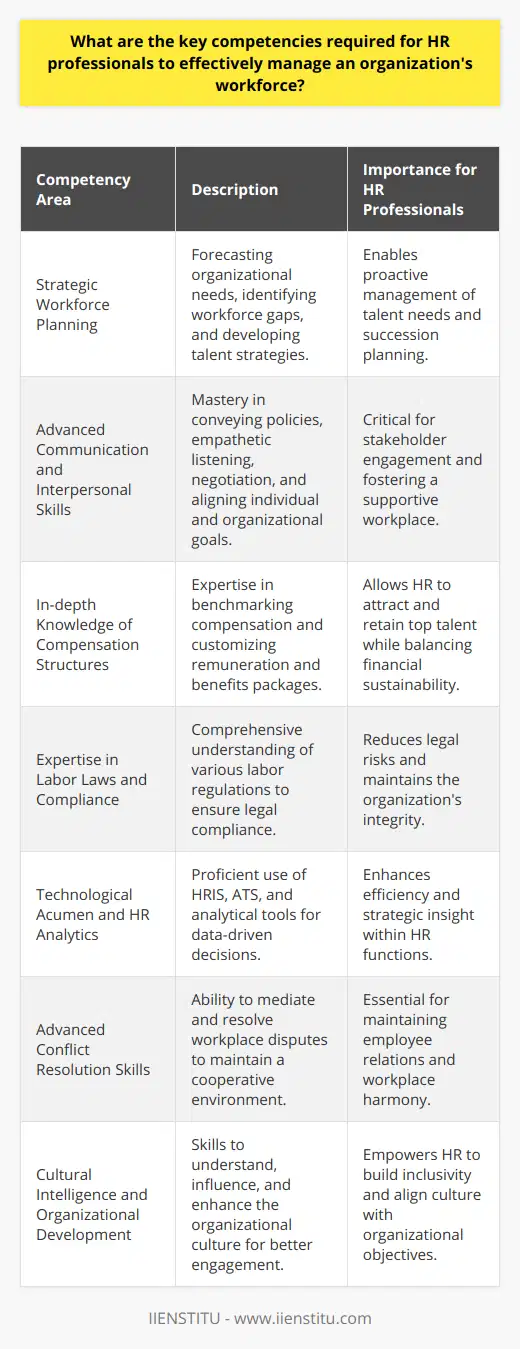
How does HR contribute to the overall strategic planning and decision-making process within an organization?
Human Resource (HR) plays a crucial role in the strategic planning and decision-making process within an organization.
Role in Strategic Planning
HR contributes to strategic planning by aligning the workforce with the organization's goals. They forecast manpower needs and develop a plan to meet those needs.
Talent Management
HR plays a vital role in talent management. They identify, attract, and retain the best talent necessary to meet the company's strategic objectives.
Employee Training and Development
They empower employees through training and development programs. These initiatives build capabilities, increase productivity, and create a better organizational culture.
Workforce Adaptation
HR facilitates adaptation to change. They conduct readiness surveys and develop change management strategies to ensure a smooth transition during strategic changes.
HR Metrics and Analytics
HR helps drive evidence-based decision making through metrics and analytics. They provide crucial data on employee performance, attrition rates, and recruitment efficiency.
Ethics and Compliance
HR safeguards the organization's ethical stance. They establish codes of conduct, monitor compliance, and manage conflicts, thereby reducing the risk of legal complications.
Employee Engagement
HR promotes employee engagement, which has a direct impact on productivity and performance. They craft policies and initiatives that foster a positive work environment.
In conclusion, HR plays a fundamental role in strategic planning and decision making within an organization. They ensure the workforce matches the firm's strategic goals, develop and execute training programs, aid in change management, provide insightful data, uphold organizational ethics, and boost employee engagement. By doing so, they contribute significantly to the overall success of the business.
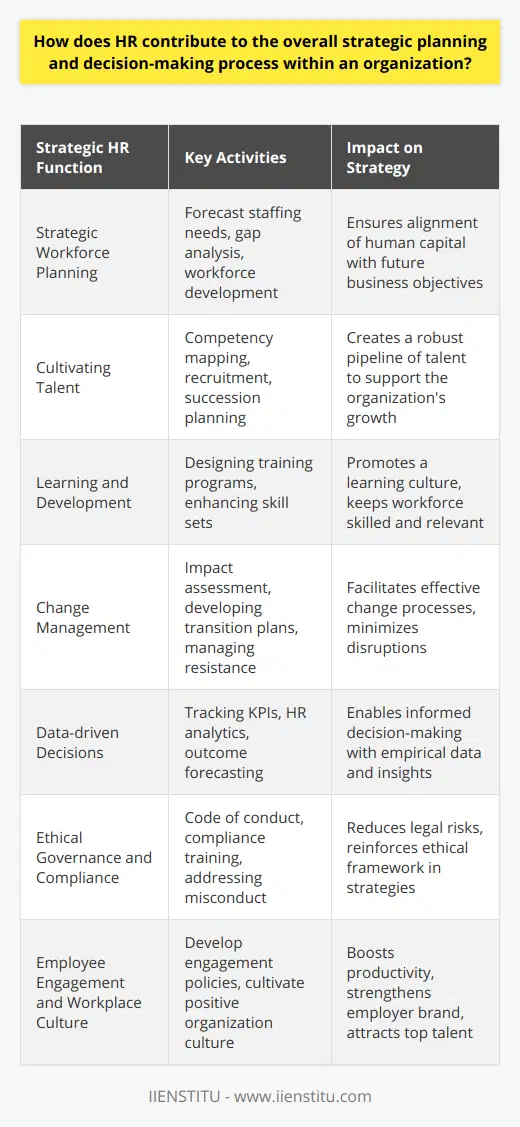
What are the essential ethical considerations that HR personnel must adhere to when dealing with employee-related issues?
Transparency and Consent
Foremost, HR personnel must ensure transparency in all their processes. It involves clearly explaining policies, procedures, rights and responsibilities to all employees. It includes providing detailed reasons for employment decisions to ensure equity and fairness.
Maintaining Confidentiality
Another critical aspect is the preservation of privacy and confidentiality. HR professionals have access to sensitive personal information for employees. They must not disclose any private information unless for a valid work purpose and with the employee's consent.
Avoiding Discrimination
Avoiding all forms of discrimination, implicit and explicit, is a crucial ethical consideration. This principle implores HR professionals to treat every employee equally. HR must ensure job opportunities, promotions, or rewards are available to all irrespective of race, gender, age, or other protected characteristics.
Resolving Conflicts Impartially
HR personnel should handle disputes with impartiality, focusing on the facts. They should avoid siding with any party without due consideration of the facts. It shows respect for the individuals involved and upholds the principle of fairness.
Promoting Employee Well-being
Lastly, HR should prioritize the well-being of employees. They should not compromise on factors affecting employees' physical and mental health. Whether drafting policies, resolving disputes or dealing with compensation issues, their intention should promote a healthy and positive work environment.
Thus, these ethical considerations create a trusted, inclusive, and positive workplace. HR professionals adhering to these principles demonstrate a commitment to fairness, respect for privacy, impartial conflict resolution, and employee well-being. As a result, they build workplaces that not only attract but retain their staff.
